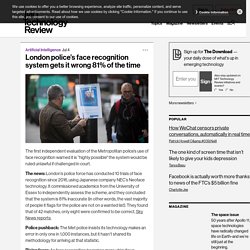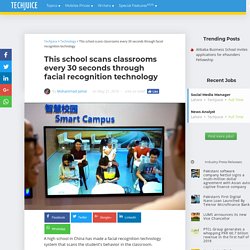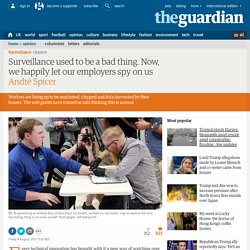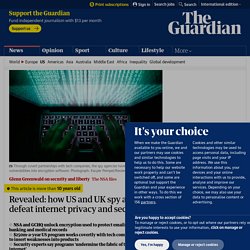

Chinese border guards are putting a surveillance app on tourists’ phones. The spyware gathers everything from text messages to people’s contacts, and also looks for content China considers threatening.

The news: An investigation by several publications, including Motherboard, the New York Times, and the Guardian, has uncovered a systematic effort by China to spy on devices carried into Xinjiang. It’s part of a massive surveillance operation launched by China in the northwestern territory, which is home to a Chinese Muslim population known as Uighurs. The spyware: Traders, tourists, and other people crossing the land border from central Asia into Xinjiang are being asked to hand over their phones. Border guards are then loading an app known as Fengcai onto them. This sucks up calendar entries, text messages, phone contacts, and call logs, all of which are then sent to a remote server.
London police’s face recognition system gets it wrong 81% of the time. The first independent evaluation of the Metropolitan police’s use of face recognition warned it is “highly possible" the system would be ruled unlawful if challenged in court.

The news: London’s police force has conducted 10 trials of face recognition since 2016, using Japanese company NEC’s Neoface technology. ABC News Live: Manafort guilty, Cohen plea deal and Mollie Tibbitts' body found. French school in row over tracking pupils electronically. Image copyright AFP.
This school scans classrooms every 30 seconds through facial recognition technology. A high school in China has made a facial recognition technology system that scans the student’s behavior in the classroom.

The facial recognition technology introduced in the school is recording facial expressions of all students while they are in their classrooms. The system scans the classroom every 30 seconds and recognizes seven different expressions such as neutral, happy, sad, disappointed, scared, angry and surprised. The system is called as“Intelligent Classroom Behavior Management System” and it is being used at Hangzhou No. 11 High School.
With scanning facial expressions the system has the ability to even analysis six types of behaviors by the students such as standing up, reading, writing, hand raising, listening to the teacher, and leaning on the desk. The information regarding how the students are reacting and behaving in the class when a teacher teaches is later sent to teachers to more efficiently analyze the behavior of students. Related. 20 Minutes. Sur Twitter une lycéenne a publié le règlement intérieur de son lycée qui s'appliquera à la rentrée 2018-2019.

Cette année, un nouvel encadré s'est glissé en tête du document. L'établissement parisien Rocroy Saint-Vincent de Paul indique que les élèves recevront en début d'année « un porte-clés connecté (Bluetooth) » qu'ils devront avoir « en permanence sur eux ». Objectif du dispositif : « S'assurer de la présence de chacun d'eux en classe, sur les installations sportives, au CDI et lors des sorties mais aussi au cours des exercices de sécurité (incendie, PPMS). » A la fin du paragraphe, il est également précisé que l'oubli du badge entraînera « une sanction appropriée » et que la perte de ce dernier sera « facturée 10 euros ». Soumis à consentement « A partir du moment où il s'agit de géolocalisation, il faut que cela soit soumis au consentement des personnes, sinon c'est illégal, même si le lieu est privé », explique à 20 Minutes Arthur Messaud, juriste à la Quadrature du Net.
Surveillance used to be a bad thing. Now, we happily let our employers spy on us. Every technical innovation has brought with it a new way of watching over workers.

CCTV allowed nosy managers to keep an eye on the shop when they were not around. Software systems have been used to track the number of keystrokes an administrator makes a minute, how often they move their mouse or how long they spend lurking on the web. Projet 'CCTV in Schools' (EOi en B1) - [English website of the Académie de Toulouse] CCTV cameras to be installed in cemetery after callous thieves target babies' graves. Bereaved families are hoping to install CCTV cameras in a cemetery after thieves vandalised babies' graves.

The families were left devastated after a series of attacks on the final resting places of young children buried at Newcastle's West Road Cemetery. Toys and trinklets loving left at the headstones were stolen over recent weeks leading the parents to set up an online fundraising page in a bid to raise money for a security camera. Revealed: how US and UK spy agencies defeat internet privacy and security. US and British intelligence agencies have successfully cracked much of the online encryption relied upon by hundreds of millions of people to protect the privacy of their personal data, online transactions and emails, according to top-secret documents revealed by former contractor Edward Snowden.

The files show that the National Security Agency and its UK counterpart GCHQ have broadly compromised the guarantees that internet companies have given consumers to reassure them that their communications, online banking and medical records would be indecipherable to criminals or governments. NSA collecting phone records of millions of Verizon customers daily. The National Security Agency is currently collecting the telephone records of millions of US customers of Verizon, one of America's largest telecoms providers, under a top secret court order issued in April.

The NSA files.